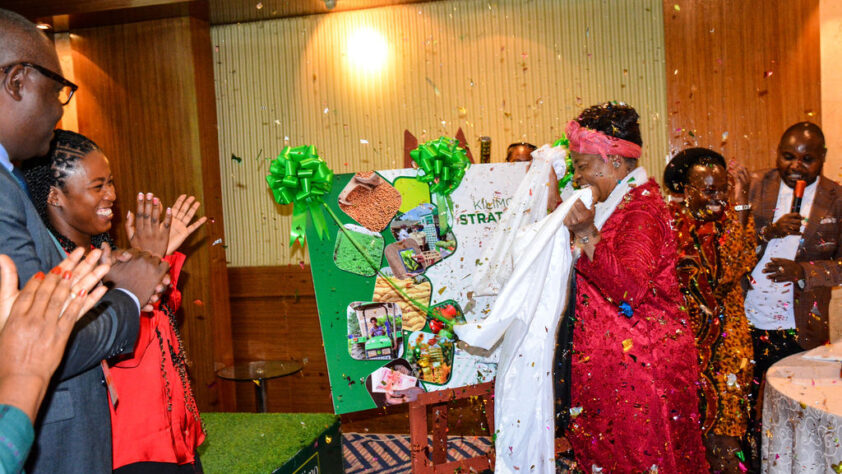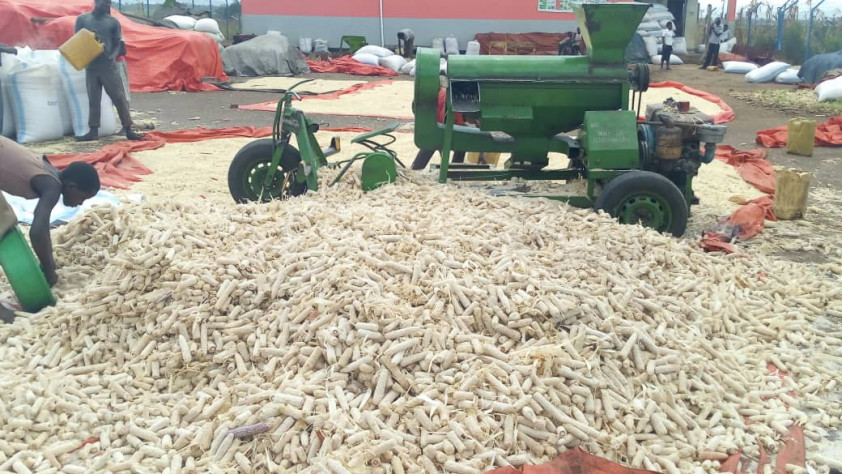Kyela Rice Processors Ltd (KRPL) is a private company dealing with paddy milling and rice trading based in Kikusya village, Itope ward, Kyela in the Mbeya region of Tanzania.
The company is implementing the Competitive African Rice Initiative Phase II (CARI-II) project under the Kyela Rice Market Development Consortium.
CARI-II is a three-year (2018-2021) project funded by GIZ and implemented by Kilimo Trust in Tanzania. CARI-II’s strategy is to build on the identification, optimization and expansion of sustainable business models that integrate small-scale rice producers.
The project’s technical and financial assistance is based on a value chain approach. It has engaged Matching Grant Fund partners and accessed USD 2,072,916 million for investment in improved processing, marketing, transport trucks, storage facilities and working capital.
Ten farmer based organization (FBO) business plans for 10 FBOs were developed for them to access finance from financial institutions.
The business plans’ objectives include increased experience sharing among rice value chain actors and the sustainable improvement of inclusive business relationships.
CARI-II also aims at improving rice value chain actors’ access to financial services and improved policy framework for rice value chain.
Before the CARI–EAII project, KRPL used to pack rice in materials without the Tanzania Bureau of Standards (TBS) quality mark that posed major limitations of access to national and international markets.
The main challenge KRPL faced in marketing is that most traders were using Kyela Super Rice as their brand name yet the rice was not from Kyela. This pushed KRPL to modify its brand by naming it “Kyela Aromatic Rice.”
Through the CARI EA Project, KRPL was guided on the procedures of attaining the TBS Mark. The company was linked up with the Small Industry Development Organization (SIDO) that deals with inspection of milling and certification to TBS.
Technical advice on good manufacturing practice, training and quality from the East Africa Standard manual enabled the company to attain the TBS mark.
Currently, KPRL is using the new brand name with the TBS quality mark and believes that it is now in a position to increase sales and access more rice markets in supermarkets around the East African Community, the Southern African Development Community (SADC), World Food Programme (WFP) and the United Nations High Commissioner for Refugees (UNHCR) hence increase its revenues.
“Attaining the TBS quality mark and the new brand Kyela Aromatic Rice will enable the company to penetrate the regional market without any barriers and our sales are expected to increase by 35%,” says KRPL Managing Director, Ms Sophia Mwaipopo.
Opportunities identified and pursued in CARI-II have seen consortia matching fund projects made operational and the establishment of improved business models for paddy production and supply. Other expected project results are the increased throughput of rice mills and market share of engaged CARI partners as well as paddy quality and quantity.
The volume of improved seeds available to farmers has increased as has financing agreements between farmer business organizations (FBOs) and financial institutions such as the National Microfinance Bank (NMB Bank) and others.
CARI-II recommendations have been adopted by government, the membership base of rice industry platforms has increased, and knowledge exchanged at regional level is enhanced. A platform for discussion of regional issues affecting rice intra-regional trade is in place with improved framework conditions through a revised national rice development strategy.
Key CARI-II achievements include the engagement of 6 consortia partners.A total of 32,825 farmers (43% women) have been integrated in the consortia. The target of 30% women has already been surpassed.
Furthermore, Matching Grant partners signed contracts with 25,321 (77%) of the integrated farmers for aggregation of paddy.Yield has been increased to 5.4 metric tonnes per hectare from 4.3mt/ha in rainfed areas and to 5.7 metric tonnes per hectare from 4.8 mt/ha in irrigated systems; representing a 125 % and 118% increase, respectively.
Farmers’ income has increased from USD 365.4/ha to USD 980.4/ha and 21, 060 farmers have been trained on sustainable rice production (SRP) practices while 4, 084 have been trained on the farmer business school (FBS), another 9,079 in financial literacy training, and 11,045 have been trained on nutrition.
A total of 25,321 farmers signed supply contracts with engaged off-takers, 77,684 metric tonnes of paddy have been supplied to MG partners and14,112 farmers accessed USD 1,772,510 million as input pre-financing from various banks.
Kilimo Trust signed a memorandum of understanding (MoU) with the International Rice Research Institute (IRRI) for the promotion of improved rice seed while another MoU was signed with the Tanzania Agricultural Development Bank (TADB) for access to finance for MG partners.
Kilimo Trust is partnering with Tanzania’s Ministry of Agriculture in the implementation of the National Rice Development Strategy (NRDS) II and the CAR-II project funded by GIZ.


